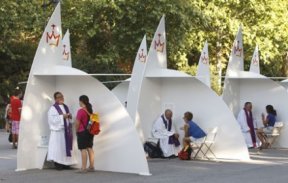
 S IT HARD to go to confession? Sometimes even very faithful Catholics find the Sacrament of Penance daunting. There are many factors: sometimes we feel unprepared; maybe we know the priest very well; we easily forget the form or the Act of Contrition.
S IT HARD to go to confession? Sometimes even very faithful Catholics find the Sacrament of Penance daunting. There are many factors: sometimes we feel unprepared; maybe we know the priest very well; we easily forget the form or the Act of Contrition.
Then, of course, there are times when we know we need Reconciliation, but we avoid going because we’re not sure how to say some of the things we know we need to say. Some things are just difficult to say. Others are embarrassing, complicated, or even (in a strange way) humorous. But they need to be said. How?
One thing that should be a solace to us is that what the Church asks the penitent to say in Confession is minimal. Penitents are required to state only the nature and frequency of their sins. As a confessor, I sometimes experience penitents who say too little, but more frequent is the penitent who wants to say too much. What needs to be said is simply enough to convey the essence of what the sin entailed (not necessarily every specific, gory aspect) and how many times the sin was committed. This is not permission to skip confessing some sins; we must confess our sins, but not in graphic detail.
When we find ourselves nervous or afraid to confess, it may be helpful to see things from the other side of the confessional. I cannot think of a single confession I have heard that has caused me to think less of the penitent, whether I knew them or not. As a priest hearing confessions, I am consistently impressed by the humility of people who come to receive the mercy of our Lord. I’ve often heard folks remark that “You can’t say anything Father hasn’t already heard,” which is probably true. But, more importantly, you can’t say anything that God doesn’t urgently want to forgive through the ministry of his priests.
The Sacrament of Penance is not just for Lent or Advent. Chances are high that each of us sin every single day. We ought not to let any obstacle delay our reception of God’s grace, which He so desires to share with us through Reconciliation. After all, He came to call sinners, not the just.
When we approach Him in humility, He always gives us pardon & peace.
